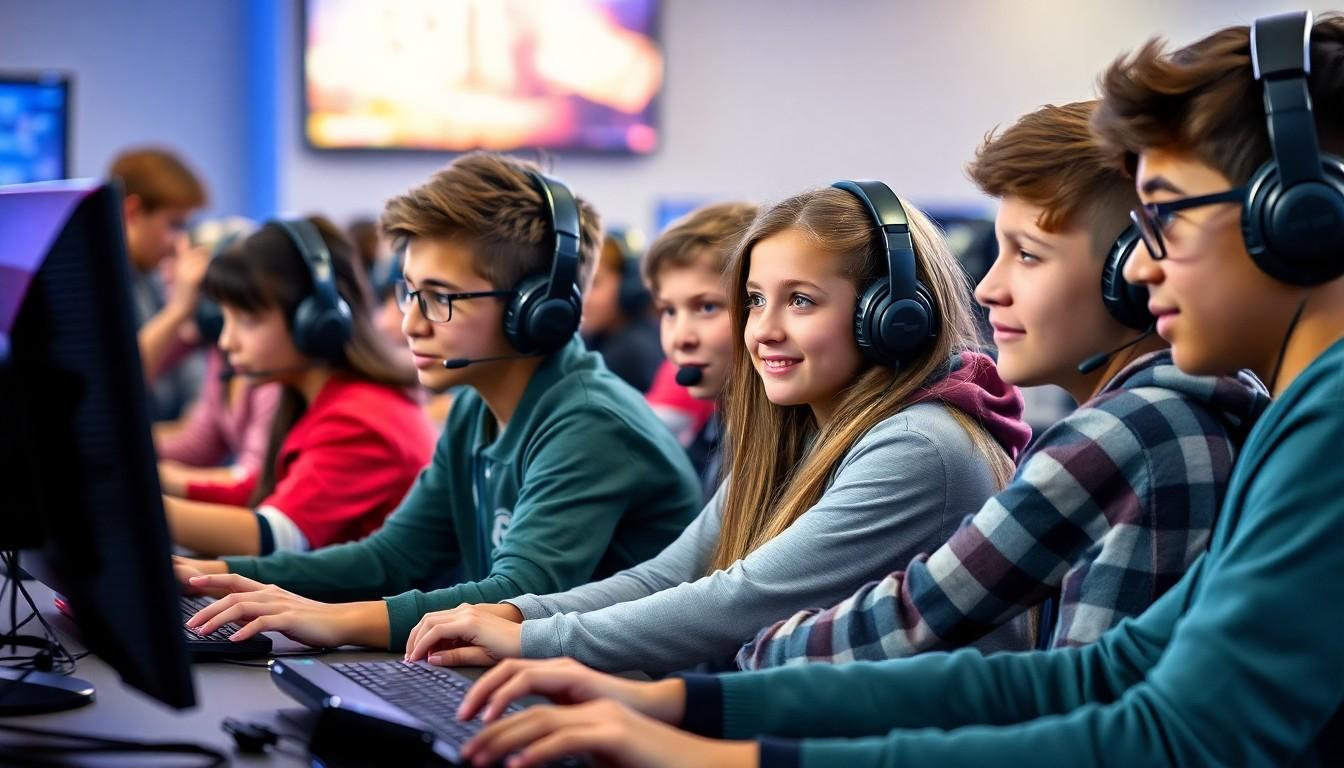The Best Fluffy Pancakes recipe you will fall in love with. Full of tips and tricks to help you make the best pancakes.

What is Esports in Middle School? Discover the Benefits, Games, and Challenges
Esports in middle school is more than just kids glued to screens; it’s a vibrant world where teamwork meets strategy, and competition gets a digital twist. Imagine a playground where instead of dodgeballs, students are battling it out in epic tournaments, honing skills that’ll impress even the most seasoned gamers.
Understanding Esports in Middle School
Esports represents a blend of competitive gaming and teamwork, captivating middle school students. Increasing numbers of schools recognize the educational benefits of this modern competition.
Definition of Esports
Esports involves organized, multiplayer video game competitions. Players compete individually or in teams, often in popular titles such as League of Legends or Fortnite. Engagement in esports fosters critical thinking, communication skills, and collaboration among participants. Schools often structure tournaments around established leagues that adhere to specific rules, contributing to a professional gaming atmosphere. Competitive gaming serves as a new outlet for student interests, aligning with traditional sports in valuing strategy and teamwork.
The Evolution of Esports in Education
The integration of esports in education has gained momentum in recent years. Beginning in 2010, high schools started adopting esports to promote teamwork and school spirit. Recently, middle schools have followed suit, reflecting this trend. Educators recognize how engaging students through gaming can improve their academic performance and social skills. Many institutions now offer esports programs as part of their curriculum, providing students with resources and coaching. Structured leagues and competitions enhance student engagement while promoting inclusivity and diversity in gaming.
Benefits of Esports for Middle School Students

Esports offer various advantages for middle school students, enhancing both their social and cognitive skills.
Enhancing Teamwork and Collaboration
Teamwork thrives within esports. Players collaborate to develop strategies in competitive games. Communication remains vital; students learn to articulate ideas clearly and constructively. Students also build trust as they navigate challenges together. Moreover, the camaraderie formed during practice sessions encourages lasting friendships. Engaging in team-based competitions fosters a sense of belonging, significantly improving school spirit. Many programs emphasize inclusivity, welcoming diverse participants. Through shared goals, students gain invaluable experience in working as a cohesive unit.
Developing Critical Thinking Skills
Critical thinking features prominently in esports. Players analyze opponents’ strategies and adapt their own in real-time. Decision-making becomes essential; students evaluate multiple options under pressure. Such gameplay causes them to think creatively, often leading to innovative solutions. Furthermore, they learn to assess risks and rewards during competitions. This skill translates to academic settings, where problem-solving is equally crucial. Observational skills also sharpen as players study gameplay dynamics. Overall, engaging in esports equips students with tools that enhance their academic and personal lives.
The Different Types of Esports in Middle Schools
Esports in middle schools encompasses various formats and games, engaging students in diverse competitive experiences.
Popular Games Played
League of Legends captivates many middle school gamers with its strategy and teamwork. Fortnite attracts a different crowd, promoting quick thinking and adaptability. Students also enjoy titles like Rocket League, where driving skills and capabilities shine. Super Smash Bros. offers a fun and competitive environment, fostering friendly rivalries. Games like Among Us encourage cooperation and deduction, enhancing social interaction in gaming. Collectively, these games provide a dynamic esports landscape that appeals to a broad range of interests.
Participation Formats
Middle schools utilize various formats for esports competitions. Team tournaments often encourage collaboration and communication among players. Individual competitions allow for personal skill development and showcase talent. Schools frequently organize leagues, promoting regular match play and exciting rivalries. Online tournaments offer broader participation, enabling students to compete against peers from different regions. Events sometimes include live-streaming, enhancing engagement and school spirit. Each format serves to foster school pride while engaging students in a healthy competitive atmosphere.
Challenges of Implementing Esports in Middle Schools
Implementing esports in middle schools faces several challenges that schools must address for successful integration.
Addressing Concerns Over Screen Time
Concerns about excessive screen time often arise when discussing esports in educational settings. Parents and educators worry about the potential negative impact on students’ health and well-being. Establishing guidelines for gameplay duration can mitigate these worries. Schools can implement structured schedules that limit practice and competition times. Education on responsible gaming habits serves to inform students about balance and moderation. Providing physical activity alternatives alongside esports can create a well-rounded experience.
Balancing Academic Responsibilities
Balancing academic responsibilities with esports participation presents another significant challenge. Students may struggle to manage their time effectively, leading to potential declines in academic performance. Schools can assist by developing policies that promote time management skills within esports programs. Encouraging academic achievements alongside gaming fosters accountability among participants. Regular communication between coaches and teachers aids in monitoring student progress. Monitoring grades ensures that students prioritize their studies while enjoying competitive gaming.
Conclusion
Esports in middle schools represents an exciting evolution in student engagement and skill development. As students immerse themselves in competitive gaming, they cultivate essential life skills like teamwork and critical thinking. This modern approach to competition not only enhances their social interactions but also promotes inclusivity within the school community.
While challenges such as screen time and academic balance exist, proactive measures can ensure a healthy integration of esports into the educational framework. By fostering a structured environment, schools can help students thrive both academically and as gamers. The future of esports in middle schools looks promising, paving the way for a new generation of players who are ready to tackle challenges both in-game and in life.




